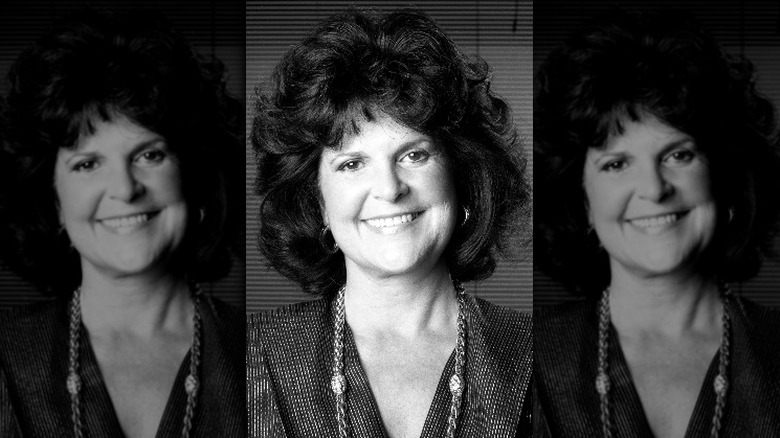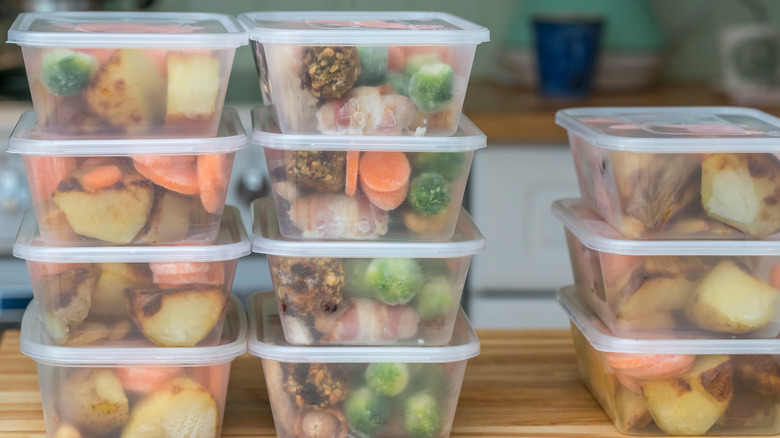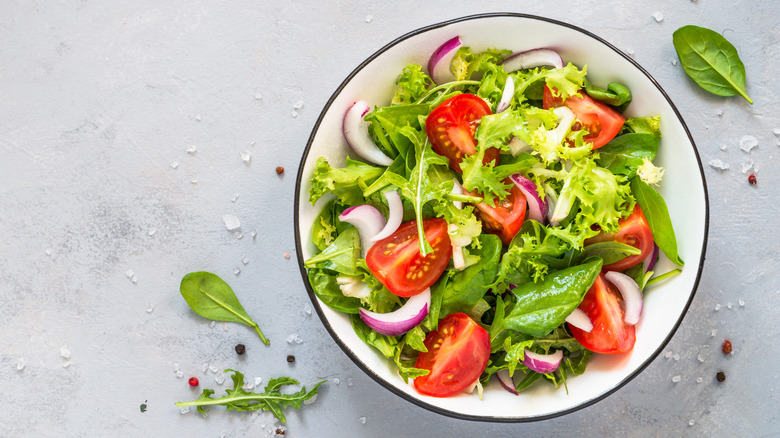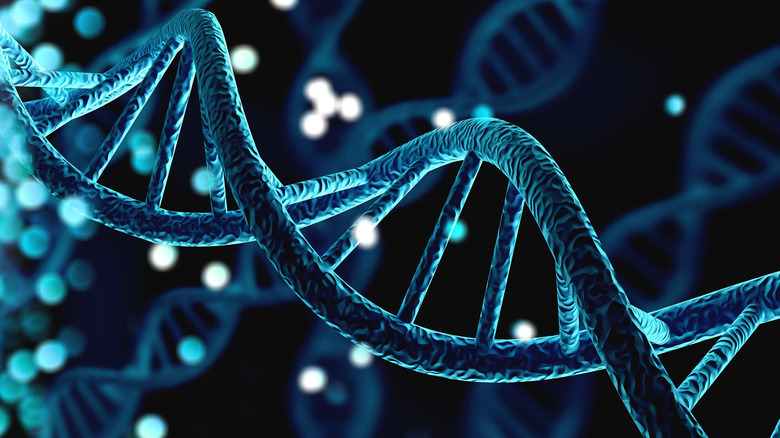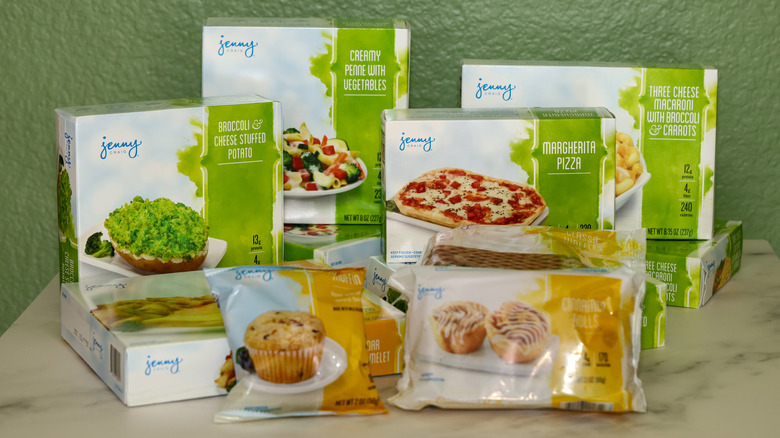Jenny Craig: A Comprehensive Guide Before You Start
Whether you've just joined Jenny Craig or are thinking of signing up, you may be curious how this diet stacks up to others. The U.S. News & World Report's best diet rankings for 2021 are in, and there are plenty of familiar faces on the list. In first place is (as usual) the Mediterranean Diet, followed by a tie between the Dietary Approaches to Stop Hypertension (DASH) Diet and the Flexitarian Diet. A bit further down the list are commercial diets — the kind that require you buy specific products or plans — including Jenny Craig.
The experts behind the U.S. News & World Report rankings ultimately deemed Jenny Craig the 12th best overall diet out there. They wrote that the diet was easy to follow, since you can get all your meals delivered directly to you. Additionally, they noted that there's no guesswork involved in following the Jenny Craig program. You input some information about yourself and your goals, pay a fee, and get a "personalized" suite of meals to meet your needs.
However, many experts warn against Jenny Craig and other low-calorie commercial diets that advertise significant weight loss. Here's more about what Jenny Craig is, how it works, and what the evidence has to say about it.
Jenny Craig is a real person who founded the program after her own weight loss journey
According to the Jenny Craig website, Jenny Craig was in fact a real person. The story goes that after Craig lost weight following the birth of her first child "through her own combination of diet and exercise," she realized that other women likely wanted to do the same but didn't have anywhere to turn for help.
So, Craig started working at a gym in the 1960s, helping others with weight loss. She went on to open her own gym and by 1983, she and her husband Sid Craig opened the first Jenny Craig weight loss center. The Craigs advertised the center, and the program it sold, as a "comprehensive approach to weight loss" that included both diet and exercise.
Today, Jenny Craig is one of the world's largest weight loss companies; there are about 600 Jenny Craig weight loss centers around the world. Each one staffs "weight loss consultants" to guide clients through the Jenny Craig program, who are also available via phone or video chat. The program itself consists of meals delivered to clients' homes, and the meal programs are designed by registered dietitians.
The Jenny Craig program is based around prepackaged meals and snacks
At its core, Jenny Craig is a weight loss-oriented meal program that consists of prepackaged meals and snacks (via Jenny Craig). To sign up, you'll answer a few questions on the company's website. Next, you'll be directed to a checkout page for your chosen plan. On that checkout page, you'll be able to see your meal plan for the upcoming week.
Each weekly box of food contains seven breakfasts and seven lunches. If you've chosen an upgraded plan, you can also receive a week's worth of dinners and seven snacks/desserts. There are many rotating items on the menu, and the meals are either frozen or shelf-stable. You will still need to do some light grocery shopping, even on the most comprehensive plan. Weekly food boxes can either be delivered to your door, or picked up at your nearby Jenny Craig weight loss center.
The Rapid Results Max plan is the most comprehensive Jenny Craig plan
Although Jenny Craig does offer plans for weight maintenance, its most comprehensive plan is the Rapid Results Max Weight Loss Plan (via Jenny Craig). As of this writing, the plan — which is billed as Jenny Craig's "most effective plan ever" by the company — costs $25.99 per day ($181.93 per week), includes seven breakfasts, lunches, dinners, and desserts, delivered to your door each week (or picked up curbside). In addition, Rapid Results customers get seven Recharge Bars, which are packaged snack bars designed by Jenny Craig. These bars are meant to help keep you full and satisfied.
In addition to the food you'll recieve, the Rapid Results Max Weight Loss Plan comes with access to a personal weight loss coach, trained by Jenny Craig, who will be there for one-on-one support. You can connect with your coach at a Jenny Craig location or over the phone. Jenny Craig sells this personalized coaching as a real plus, which makes sense. According to a 2010 randomized controlled trial sponsored by Jenny Craig and published in the Journal of the American Medical Association, women on a commercial diet who had one-on-one support lost significantly more weight than those who did not have this support.
Jenny Craig claims that you can lose up to 17 pounds in your first four weeks on the Rapid Results Max plan
According to Jenny Craig, following the Rapid Results Max Weight Loss Plan can lead to up to 17 pounds of weight loss in the first four weeks. That's a lofty claim, and it's also somewhat misleading. It comes from a 2010 randomized controlled trial published in the Journal of the American Medical Association, which was sponsored by Jenny Craig. For starters, the study only included women, so it's impossible to apply the findings to men. Secondly, 17 pounds is the maximum amount of weight lost by any participant in the first four weeks — the average was 13 pounds (via Jenny Craig).
After two years, participants who got in-person coaching lost an average of 16.4 pounds. Those who checked in with coaches by phone lost an average of 13.7 pounds after two years, and those who just got the meal plan (no coaching), lost an average of 4.4 pounds. In other words, most women in the study lost far less than 17 pounds after two years on the program.
On the Rapid Results Max plan, you'll cycle through a menu of over 100 meals
Although a meal plan will determine which meals and snacks you'll get each week on the Jenny Craig plan, there's a good amount of variety in the Rapid Results Max Weight Loss plan. Additionally, you can specify allergies and intolerances to make sure none of your meals contain the things you can't eat.
There are over 100 meals available on the plan, and your weekly menus will be fairly varied (via Healthline). A sample menu for the first week of the Rapid Results plan includes a variety of sweet and savory breakfasts — from apple cinnamon oatmeal to an egg, cheese, and turkey burrito. Lunch includes pasta dishes and sandwiches — from spaghetti and meatballs to a ham and Swiss cheese baguette (and a pepperoni pizza!). Dinner is similar, with options ranging from chicken marsala to risotto with turkey, mushrooms, and peas.
Snacks are either savory or more dessert-like: cheese curls, lemon cake, and blue corn tortilla chips are just a few of the options (via Jenny Craig). While it's possible that you'll get bored with the food over time, it's undeniable that there's a good amount of variety in the menu.
You should supplement pre-made Jenny Craig meals with fruits, vegetables, and low-fat dairy
On the Jenny Craig program, you'll be provided with meals, but you'll still be encouraged to add fresh fruits, vegetables, and low-fat dairy to them (via Jenny Craig). You'll also need to eat "one fresh snack of your own" each day, according to the company. "Our consultants will guide you on how to combine our delicious meals and snacks with fresh fruits and vegetables for a complete balanced meal plan," per Jenny Craig.
This emphasis on fresh fruits and vegetables is a good thing. According to the 2020-2025 Dietary Guidelines for Americans (DGAs), eating five servings of fruits and vegetables promotes good health. Fruits and vegetables are jam-packed with fiber, vitamins, and minerals, all of which help our bodies function optimally. The DGAs explain that eating adequate amounts of these foods every day has been shown to lower your risk of many chronic diseases.
While many of the Jenny Craig prepackaged meals do contain some fruits and vegetables, it's important that you add more of these foods yourself. Sure, you'll still lose weight in the short term if you eat only the food that's provided for you, but you'll be missing out on the long-term health benefits of fresh fruits and veggies.
Jenny Craig is appropriate for some special diets, but not all
According to WebMD's review of the Jenny Craig program, the plan is appropriate for certain dietary restrictions, but not all of them. Because of the nature of the prepackaged meals, it isn't possible to make alterations or substitutions to existing menu items.
Not many of the prepackaged meal options are meatless.There are enough meatless options that a vegetarian version of Jenny Craig is possible, but it might get redundant pretty quickly. And still, all meatless entrees contain dairy, so you can't do the Jenny Craig program if you're vegan.
Jenny Craig is much more friendly to other special diets. If you're on a low-fat diet because of a doctor recommendation, all Jenny Craig meals will work for you, since they're all low in fat. The same is true for a low-sodium diet that may have been recommended to lower your blood pressure or help manage your heart condition (via WebMD). On the Jenny Craig plan, you'll get no more than 2,000 milligrams of sodium per day from the prepackaged food. You'll have to be mindful not to add salt, though, and to choose low-sodium extras like fresh fruits and vegetables for snacks.
The Rapid Results Max plan comes with personalized coaching, although coaches are not nutrition experts
The Jenny Craig program advertises one-on-one coaching as a huge benefit of the Rapid Results Max Weight Loss Plan (via Jenny Craig). However, what the Jenny Craig program website doesn't totally make clear is that these coaches are not nutrition experts.
In a Jenny Craig job posting , the qualifications and skills required to become a "Health/Wellness Coach" are: a high school diploma or equivalent, sales or retail experience, basic computer skills, the ability to multitask, and strong listening and motivational skills. There's a "five-day onboarding" training, paid for by the company, through which coaches learn the Jenny Craig program methods. Coaches are also expected to follow the program for a period of time, "as a part of induction to provide knowledgeable, real world experience to clients."
The responsibilities outlined in the job posting make it seem like a coach's main job is to sell the program to clients and retain them. The fact that these health/wellness coaches don't need any nutrition credentials is, at the very least, something "worth noting" (via Healthline).
Jenny Craig offers additional plans for weight maintenance and management
The Rapid Results Max Weight Loss Plan is the most comprehensive program offered by Jenny Craig, but there are two less expensive plans offered as well. As of this writing, the Simple Meal Plan costs $12.99 per day ($90.93 per week before delivery costs) and comes with seven breakfasts and seven lunches (via Jenny Craig). The site explains that the Simple Meal Plan is "great if you are looking to maintain your weight with quick healthy options during the day and want to prepare dinner on your own." You'll also have to provide your own snacks.
The Essential Meal Plan costs $20.78 per day ($145.46 per week, including free delivery) and comes with seven breakfasts, seven lunches, and seven dinners. According to Jenny Craig, this plan is "ideal for people looking to manage their weight with a turnkey plan that includes three healthy meals a day." Although you'll get all of your meals delivered, you'll need to provide your own snacks. And, as with all plans, you'll need to supplement your diet with fruits, vegetables, and low-fat dairy.
Jenny Craig encourages you to remain a member after you've lost weight
Although Jenny Craig is marketed as a weight-loss program, the company recommends that you stay on one of their plans even after you've lost the weight, presumably forever.
The Simple Meal Plan, in particular, is marketed toward people who have already lost the weight they hoped to lose, and are now hoping to maintain that weight loss (via Jenny Craig). Jenny Craig explains that continued nutrition coaching, which isn't included in the Simple nor Essential plans and will cost an additional fee, is what helps people maintain weight loss. However, nutrition experts have a problem with this model.
"My biggest issue with commercial prepackaged plans are maintenance," dietitian Angela Lemond told Everyday Health, who added that it's nearly impossible to maintain the weight loss when you go off the plan. And while Jenny Craig encourages you to stay a member for life, this seems highly unlikely. These prepackaged meals will likely become boring over time, or won't fit with your lifestyle anymore.
Jenny Craig plans start at 1,200 calories per day
The Jenny Craig program advertises that clients can lose a significant amount of weight in the first weeks of the program. A 2016 systematic review published in the Annals of Internal Medicine found that Jenny Craig dieters lose, on average, more weight than dieters who use Weight Watchers, Nutrisystem, or Slimfast after the first year.
This isn't too surprising, considering the fact that Jenny Craig programs start at around 1,200 calories per day (via Healthline). However, that's a very low number. According to the Food and Drug Administration, sedentary women 50 and under need 1,800 calories per day, while sedentary women over 50 need 1,600 calories per day.
Diets that are so low in calories really aren't a good idea for long-term health. "It's not sustainable, and rapid weight regain occurs when the regimen ceases. It's not recommended for long-term weight loss or maintenance," dietitian Lise Gloede told U.S. News & World Report. She added that low-calorie diets like Jenny Craig don't teach true healthy eating habits, which is another reason they won't improve long-term health.
There's no evidence that the Jenny Craig diet works long term
A 2010 study sponsored by Jenny Craig found that the program does produce rapid weight loss in the first four weeks. It also found that dieters who stay on the plan and engage in regular, in-person, one-on-one coaching are able to maintain that initial weight loss for two years. However, it's important to keep in mind that the average amount of weight lost over two years was 16.4 pounds, just 3.4 pounds more than was lost in the first four weeks.
Experts at U.S. News & World Report pointed out, "In the near-total absence of rigorous long-term studies, experts are reluctant to conclude that any diet will work over the long haul." While Jenny Craig does seem to produce more weight loss in the short term than other diets, researchers haven't yet looked into whether weight loss produced by any diet is sustainable long term. This is a big reason to take Jenny Craig's weight loss claims with a grain of salt. If the diet doesn't seem enjoyable and sustainable to you, it's worth skipping.
There's not enough scientific evidence to support Jenny Craig's DNA Decoder Plan
In 2019, Jenny Craig launched the DNA Decoder plan. Dieters receive a DNA kit in the mail, send it back, and then receive personalized recommendations based on their unique DNA (via Jenny Craig).
The reasoning behind this comes from the burgeoning field of nutrigenomics, in which nutritionists are exploring how our unique DNA profiles might affect our nutrition needs. It's certainly an interesting concept, but we don't yet have enough evidence on it to know whether and how it actually works.
Venkatesh Murthy, a cardiologist who teaches at the Frankel Cardiovascular Center at the University of Michigan, told Discover that the science behind these DNA kits and the personalized nutrition recommendations that come with them are fuzzy. In existing studies, the effect of these personalized recommendations on health and weight has been extremely small (often not even significant). He explained that there's not yet enough evidence that giving someone a specific nutrition plan based on their DNA will have any effect on their health.
Jenny Craig doesn't teach sustainable habits from the start
Like all commercial weight-loss plans that come with set menus and prepackaged foods, the Jenny Craig diet doesn't implement healthy cooking — at least at the start. "Home-cooked and restaurant meals largely off-limits" is one of the cons about this diet cited by U.S. News & World Report.
A huge 2017 observational cohort study published in the International Journal of Behavioral Nutrition and Physical Activity looked at self-reported data from over 40,000 French adults. The survey participants answered questions about their cooking, eating, and various other health habits. Results showed that the adults who regularly planned meals and cooked for themselves ate a more nutritious and varied diet than those who did not.
Although Jenny Craig does recommend more home-cooking once you reach the halfway point of your goal weight, you won't be learning how to meal plan from the start (via U.S. News & World Report). Instead of trying a commercial diet like Jenny Craig, you may find it more beneficial to commit to learning a few healthy recipes and learning how to plan and cook several nutritious meals.
Jenny Craig's Max Up Program
It can be easy to confuse Jenny Craig's Rapid Results Max Weight Loss Plan with its Max Up Program. After all, both involve intermittent fasting paired with Jenny Craig products like the Recharge Bar (via Jenny Craig Australia). Additionally, coaching is part of both the Rapid Results Max Weight Loss Plan and Max Up.
However, Max Up also emphasizes staying hydrated and physically active. This was demonstrated through an internal study on the Max Up Program in 2021. A total of seven men and 25 women took part in this 4-week study. Factors taken into consideration included age, weight, and waist circumference. Participants weighed in every morning before having anything to eat. They followed the Rapid Results Max Weight Loss Plan for their meals and fasted for 14 hours a day, having the Recharge Bar once they had fasted for 12 hours. In addition, they also needed to meet the minimum hydration requirements (1.9 liters). Both cardio and strength training physical activities were also key components of the Max Up study. Finally, all 32 participants had weekly sessions with their coaches, in part to help them track their progress.
At the end of the study, Jenny Craig Australia noted that 22 of the participants had weight loss ranging from 9.52 kilos to 8.16 kilos. Six participants had a reduction in their waist circumference of more than 12.7 cm.
Who shouldn't follow the Jenny Craig diet?
According to U.S. News & World Report, not everyone is allowed to sign up for Jenny Craig. Such restrictions include if one is pregnant and/or has certain allergies. Age is also a consideration, since children younger than 13 are barred from joining.
Additionally, while 13-year-olds are allowed to sign up for the Jenny Craig Classic menu, they could still be barred if they have any health conditions. The only exceptions are if the 13-year-old is asthmatic or has seasonal allergies. Speaking of allergies, U.S. News & World Report states that persons "with allergies – such as milk, soy or wheat – can't sign up [for Jenny Craig]." Anyone who has gluten-related health issues like celiac disease or gluten intolerance, take note: Per U.S. News & World Report, as of June 2023, there are no gluten-free meal options available through Jenny Craig. In fact, you're restricted from joining Jenny Craig if you have celiac disease.
Furthermore, there are restrictions on mothers who are breastfeeding. Specifically, they aren't allowed to join until after their babies turn six weeks old. And then there's considering which Jenny Craig plan or program might be best for an individual's needs. For example, some diabetics might want to explore the Jenny Craig for Type 2 program. Speak with a medical professional before starting any diet program.
Jenny Craig is relaunching in fall of 2023
When a company has existed for decades, it can feel like it will always be around. But in May 2023, NBC reported that Jenny Craig was closing. An internal email from the company said the reason was "due to its inability to secure additional financing." According to CBS, Jenny Craig had "roughly $250 million of debt at one point." Additionally, CBS said factors like weight loss drugs and other diet plans also played a role in the company's closure.
However, in July 2023, CBS reported that the company Wellful was relaunching Jenny Craig in the fall, albeit with a major change. Wellful told CBS that both the "same delicious food and personalized coaching" will remain part of the rebooted version of Jenny Craig. But moving forward, Jenny Craig will be entirely online, meaning its weight-loss centers will be permanently closed. As a May 2023 article in People pointed out, Jenny Craig had 500 of these centers based in either Canada or the U.S.
At the time of this publication, the Jenny Craig website is a single webpage featuring photos of food and the following message: "Jenny Craig will be coming to your home this fall. Same great food, same successful weight loss, delivered to your door for free!" The website also allows visitors to submit their email address so they can be notified about the relaunch "and get weight loss tips for the summer."


